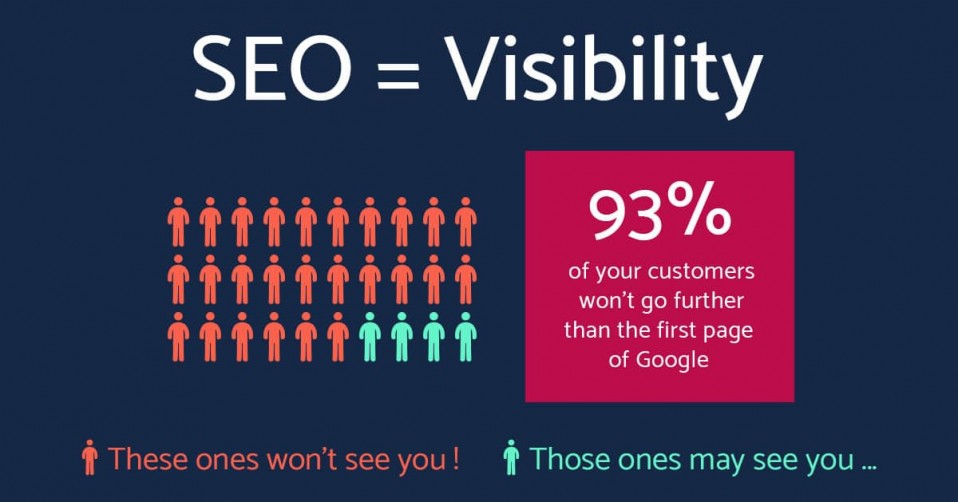You’ve probably heard many, many times that Search Engine Optimisation (SEO) is a vital digital marketing tool, but even though you may have a basic understanding of what it entails, you may still not have a solid grasp on this complex and multifaceted creature.
SEO is formed from multiple different elements, and knowing what they are and the way in which they work and work together is vital to understanding why SEO is so important. In short, SEO is critical because it makes your website more visible, which means more traffic and more opportunities to convert prospects and leads into customers.
Beyond that, it is also a valuable tool for brand awareness, building relationships with prospects, and positioning yourself as an authoritative and trustworthy expert in your field. So without further ado, here’s everything you need to know about SEO and why it’s vital in today’s digital world.
The Crucial Elements Of SEO
Keywords
Long gone are the times when keywords were the sole SEO technique that mattered, but that doesn’t mean they are not still crucial. The difference is that today, keywords must be well-researched, carefully chosen, and judiciously utilised in your content so as to be effective. But what are keywords, exactly? Keywords are words and phrases that prospects use to seek out online content, which brands can then use to connect with prospects who are trying to find their products and services.
When researching keywords, it’s important to search for ones that have high search rates and low competition and to choose and utilise short-tail keywords (such as dog), long-tail keywords (such as terrier puppies for sale), and native local keywords (such as puppies available in Boston) to work into your content. You can also use keywords to optimise all of your titles, URLs, and other on-page SEO elements (more thereon later).
Content
Content is definitely a vital element of SEO because it’s the vehicle you utilise to reach and engage with audiences. For instance, if you owned a nursery and wanted to expand your visibility, you would possibly publish a series of blogs about gardening, choosing the proper species of plants, growing tips, and more. When an individual who wanted to understand about gardening went trying to find that information, your blog would come up, and you would be ready to build a relationship with that prospect by providing valuable information. When the time came for that prospect to shop for a plant, as an example , you’d be the primary nursery that came to mind. Today’s content must be educational, but also interesting, relevant, engaging, and shareable. Content comes in a variety of forms, including:
- Web page content
- Videos
- Blogs
- Infographics
- Podcasts
- Whitepapers and e-books
- Social media posts
- Local Listings
Off-Page SEO
Off-page SEO involves external optimisation practices that happen far from your site instead of on it. The main technique used for off-page SEO is backlink building since quality backlinks to your site from external sites tell search engines that your site is effective, valuable and high-quality, and this builds authority.
There are many tactics to backlink building, and some of the current best practices include guest blogging, creating lots of infographics that will be highly shared, and mentioning influencers in your content.
Local SEO
Local SEO is becoming increasingly important as more and more people use mobile devices for search. These days, 57% of all searches are performed from tablets and smartphones, and half those searches have local intent.
If you owned a restaurant, as an example , then local SEO would make sure that when people in your area went trying to find the best restaurants in town, they’ll come upon your site. Along with using local keywords, other local SEO best practices include claiming directory listings, creating location-specific pages for your site, and creating pages for your business on Google My Business, Google+, and Google Maps.
Search Engine Marketing
Search engine marketing (SEM) refers to paid marketing efforts, and it includes things like native ads, Google AdWords, social media ads, pay-per-click, Google shopping ads, display ads, and more.
Although SEM isn’t usually a significant component of a comprehensive SEO strategy, it does have its place because it can assist you reach new and highly targeted audiences.
Understanding the Importance of SEO for Modern Businesses
Visibility and Rankings
One of the foremost important functions of SEO is increasing visibility, which suggests making it easier for prospects to find you once they look for something you have got to supply . Visibility is directly related to your ranking.
The higher you rank on a search engine result page (SERP), the more likely prospects are to see you and click on through to your site. The more effective your SEO efforts, the higher your ranking and therefore the better your visibility, which is particularly important once you consider that a quarter of web users never click past the first SERP.
Web Traffic
Increased web traffic is definitely one of the most important goals of SEO, and you increase traffic once you increase visibility and rankings. Consider this for a moment: nearly 33% of clicks visit the first and primary ranking page, and therefore the first five listings generally get over 75% of all clicks.
If you would like more prospects to find your website through a search engine, then you will need SEO practices which will assist you rank among the highest five positions, and ideally number one.
Authority
The concept of authority is comparatively new in SEO, but it’s becoming increasingly important to search engines because it’s becoming more important to web users. Essentially, authority means your website is trustworthy, top quality , relevant, and has something to supply . The more authority your site has, the higher your ranking is going to be, and therefore the more prospects will come to trust your brand.
Creating a Better Visitor Experience
Another reason SEO is critical is because all the time you invest into generating great content and optimising your site with on-page SEO improves the usability of your site, and this creates a seamless and positive customer experience.
For instance, once you take steps to make your site responsive, it will make it usable for all of your mobile visitors as well as people that visit from a laptop or desktop. Similarly, by increasing your page load speed, you’ll reduce your bounce rate and encourage visitors to spend longer on your site. Nearly 50% of consumers expect a page to load within two seconds, and therefore the longer the load time, the higher the bounce rate and therefore the lower your conversions.
Growth
In the end, the main reason SEO is important is that it can assist you achieve many of your business goals. SEO can assist you build better relationships together with your audience, improve the customer experience, increase your authority, drive more people to your site, offer you a foothold over the competition, and increase conversions, which suggests more sales, more loyal customers, and more growth for your business.
Search Engines Are Fallible
A final note that’s worth mentioning is that SEO is important because search engines aren’t perfect, and if you don’t take steps to counter their failings, then your website will pay the price.
For example, if a site doesn’t have a correct link structure, then search engines might not crawl and index the site properly, and this will lower rankings. Moreover, coding errors can block search engines entirely, making it impossible for your site to rank, regardless of what quantity of time you place into other SEO efforts. Other common areas where search engines can run into problems include:
- Duplicate pages
- Forms
- Images, flash, audio files, video, and other non-textual content
- Language and Semantics
Final thoughts
As you’ll be able to see, SEO is definitely a complex undertaking that involves many various techniques, tactics, and best practices. Moreover, these best practices are always evolving as consumer and web-user behaviors change, as new technologies emerge, and as search engines change their algorithms. That being said, SEO is still of the utmost importance for any business that wants to be visible online, so your efforts are well worth it.
SEO can help a business accomplish variety of goals, including ones involving brand awareness, traffic, conversions, customer experience, and far more, which is why it’s so important for digital marketers to possess a solid grasp of what SEO is, how it can help achieve goals, and what the foremost cutting-edge best practices are.


